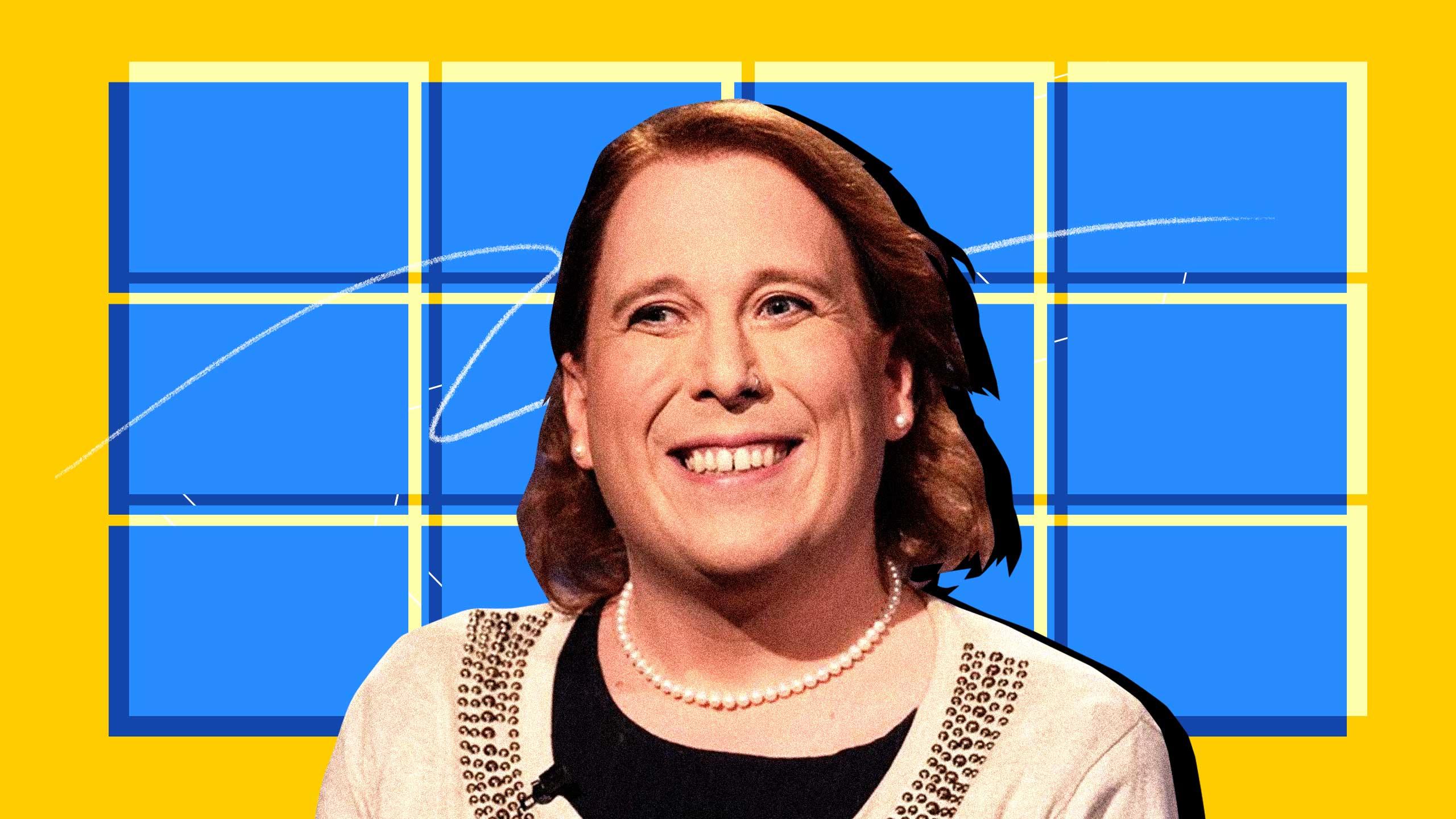I’m sitting at my computer with the full realization that the person I’m about to interview has become a millionaire literally overnight. The name I’m waiting to pop into existence in the black chamber of the Zoom screen is Amy Schneider.
Only hours after I finish speaking with her, Schneider will yet again triumph on that night’s episode of Jeopardy!. Her eyes, along with her smile, will beam brightly, and she will wear what has become her now-infamous sartorial trademark: a pearl necklace. As of publication time, Schneider has won 36 games, smashing the third-place record previously held by James Holzhauer; her winning streak so far ranks only behind Jeopardy! greats Matt Amodio and Ken Jennings.
Since her Nov. 17, 2021, debut on the show, the engineering manager from Oakland, California (originally from Dayton, Ohio), has become the winningest woman in Jeopardy! history and one of the most famous trans women in the world. But Schneider, who waited diligently for roughly a decade to assume her place behind a Jeopardy! lectern, might not be where she is today if she hadn’t begun her journey in accepting her trans identity in the first place. It could, in some ways, have been a matter of destiny.
You’re the child of an academic parent. How was learning prioritized in your upbringing, and how did that influence your interest in Jeopardy!?
Well, certainly it was something that was always encouraged. I was raised Catholic and [my mother] was raised in a very Protestant suburb of Dayton, Ohio. At the time—it would’ve been like, the ’50s—there was still a decent amount of anti-Catholic sentiment out there. She was really raised with this idea that we have to show the world that we’re not a bunch of idol-worshipping heathens; we can talk about Shakespeare and classical music.
How do you think that approach translated into competing on Jeopardy!, which one could argue is all about rote memorization.
It could be seen that way. It’s not how I have approached it, exactly. Because, you know, there’s so much of it. I suppose it’s bounded enough that you could go down the rote memorization path and do pretty well at it. But that’s never how I [went] by it. To me, it’s just about if you are out there and curious and living a life where you’re learning things all the time.
There’s this idea of a canon of knowledge that Jeopardy! really does sort of go along with, for better or worse. They certainly have tried to diversify a bit to avoid some of the biases that go along with that. Nonetheless, that’s still fundamentally the concept of the show—that you’re familiar with the general canon of knowledge that a well-educated person knows. But there aren’t many things that I’ve learned just for the sake of Jeopardy!.
In terms of your general academic pursuits, do you think that approach shaped your own identity and the way you navigate the world?
The one thing I could rely on getting praise for was always my intellectual accomplishments and my memory. Doing well at school definitely became a big part of my identity. At the same time, I always had conflicted feelings about it. It came so naturally to me. I was fortunate enough to have a very retentive brain and so I always felt a little weird about [it]. I could see my peers who cared more and were working harder than me and not always getting better results.
You’ve said you have a “cool,” hip younger girlfriend, and that you have a cat as well. How did that come about?
It was really quite a strange occurrence. It was summer of 2020 and I had just started seeing a couple of my close friends again. One of my friends was dating [someone] who turned out to be [my future girlfriend] Genevieve’s brother. For some strange reason, in whatever sequence of events, my friend ended up asking Genevieve to give her a ride to her boyfriend’s place from my place. (Without asking me first, by the way, if she could invite someone over to my apartment.) So she came up, we chatted for a bit, I gave her a tarot reading, and then we just started hanging out a lot.
It’s not a queer meet-cute unless there’s a tarot reading involved.
[Laughs.] Yeah!
When did you and your ex separate, and did it intersect with you coming into your identity as a trans person?
We split in 2016. That was about two or three years after I had first started considering my identity. It wasn’t particularly the reason we split up, but our being together had been a thing that was holding me back. I knew that she did not want to be married to a woman—quite understandably—so I hadn’t been letting myself really, really think about it. Once I didn’t have that fear of losing my marriage, or my marriage holding me back, it pretty quickly became unavoidable that I was trans.
What was it like coming out to your family?
My dad had passed away a few years earlier; it was just my mom and my brother, essentially. It wasn’t perfect, I wouldn’t say that. I remember the first thing that my mom said when I told her. I said I was trans, and she said: “Well, it’s such a hard life.” And I said, “Well, that is a fine, free action. I am fine with that.”
I come from a Catholic family, a relatively conservative one, but in my extended family, I am not the first person to come out as trans. I have a trans man who’s my cousin. Thankfully, he had kind of paved the way a little for people to get used to it, which I definitely think helped.
The Jeopardy! demographic tends to skew older—the median age for their viewership is 65. How does it feel knowing that it’s likely you’re one of the only visibly trans people that a lot of the Jeopardy! viewership has consciously interacted with?
I’ve heard from a lot of people—both from trans people themselves and from their parents or grandparents—and it definitely is really gratifying. I’ve heard from more than one person that it really made a difference with some of their family, that they really “get it now.” That’s the most amazing thing.
What was it like stepping on set for the first time?
So actually, I had seen the stage before—my ex-wife’s brother had been on [the show] seven or eight years ago, and I actually got to go to that taping, so that was kind of neat. We have rehearsal in the morning where everyone gets a couple of chances to go on stage and experience the physical reality of it. It was a real mental challenge to set it aside and ignore the fact that this was something I had been, in a sense, working toward my whole life.
I’ve told this story before, but one of the key moments of my mental preparation as I was standing on stage before every episode, from the first one, I would run through the lyrics of “Lose Yourself” by Eminem because it’s so perfect for what I needed there. Which is to say: this is your chance, this is the only one you get, so just stay in it and don’t think about anything else.
It was like a decade-long process to get on the show for you, right?
Yeah! I know that the first time I tried out, I remember I was still in Ohio, so it had to have been 2008 or earlier. I’d gotten to the last stage a couple of times. When that happens, they say that over the next 18 months, you may get a call to be on the show, or you may not. If not, then you just start over. There’s been at least a couple of times where I’d been waiting for a year hoping to get the call, and I didn’t get it.
I just knew I’d be on eventually. I felt like it was bound to happen. I kept trying. I knew I was doing well enough on the tests to move on, and it was just a matter of time.
What does being on the show mean to you?
Being on the show itself is great, but it’s not hugely meaningful. It goes back to what I was saying before, how my brain just sort of works this way, and I have a natural talent that just lends itself to the show. But what has been really meaningful is to be on there post-transition, because I started auditioning before, and I’m so glad I didn’t get on back then. Like, I can look at myself on TV and be like, “Oh yeah! She’s kind of charming!” and really actually see that and believe it. That’s something that, honestly, until a few months ago, I can’t say I’d ever really felt so truly.
Before, you said that you knew that you being on Jeopardy! was going to happen. I guess what I’m asking is this: Do you believe in fate? If so, then was this fated to be?
I guess I do, yes! When it comes down to it, fundamentally I would have to say it’s all just coincidence. But it’s so crucial that it happened after I transitioned. I was supposed to be on earlier, and there was a last-minute COVID-19 cancellation, and then Alex Trebek passed, so it got pushed back a year. Even that made a huge difference. Like, being with Genevieve rather than being single, just looking at the support network I would’ve had back then—that [network] just wouldn’t have been there.
A year ago, I would not have been able to handle it anywhere near as well as I am now. It certainly feels like it all happened for a reason.
Right now, of course, you’re on a hot streak, but have you thought about the next step after Jeopardy!? You’re kind of a trans icon now!
I wouldn’t say I’ve come to any conclusions yet, but it’s definitely something I’ve been thinking about. Certainly this is an opportunity I never expected to have, and things are coming my way in a way I never thought would happen. I’m talking to a literary agent about the possibility of writing a book. Beyond that, I’m getting invitations about speaking appearances, and they’re like, “What’s your usual honourarium?” and I’m like, “I have no idea! I have to figure that out!”
This interview has been condensed and edited for clarity.


 Why you can trust Xtra
Why you can trust Xtra


